The role of Belarus in the indoctrination and militarization of Ukrainian children: human rights defenders raised this topic in the USA, Belgium and the Netherlands
Representatives of the Human Rights Centre ZMINA, the Regional Human Rights Center (RCHR) and Freedom House visited the USA, Belgium and the Netherlands on an advocacy trip regarding the role of Belarus and the Union State (ed. – a supranational organization of Russia and Belarus with a single political, economic, military, customs, currency and cultural spaces) in the Russian system of displacement, indoctrination and militarization of Ukrainian children. These crimes were documented in cooperation with the Viasna Human Rights Center and BelPol.
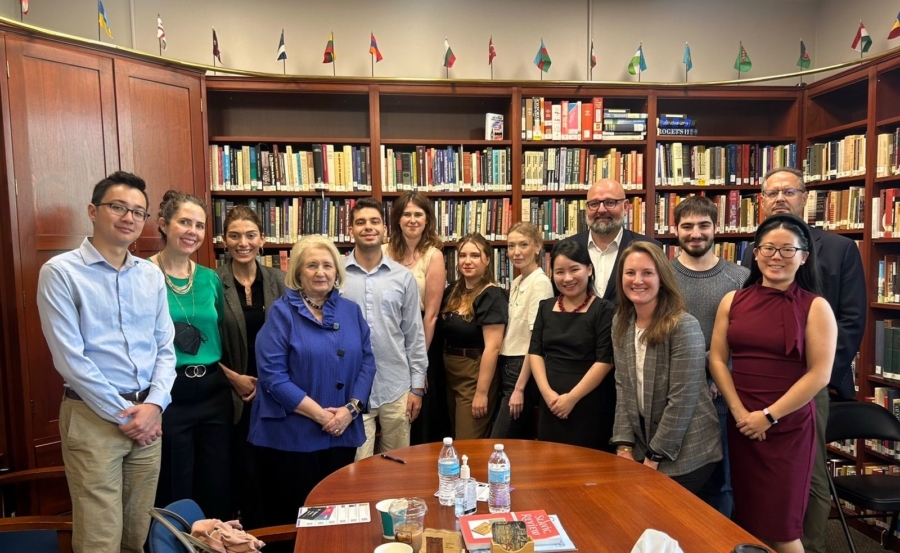 Photo: Meeting with students in Washington
Photo: Meeting with students in WashingtonHuman rights defenders met with representatives of the US State Department and the Senate, as well as civil society and academic circles in Washington. They shared the results of a study on the systematic transfer of Ukrainian children from the occupied territories to Belarus to “re-education camps”. The main attention was not paid to the process of displacing children, but to what is happening to them in the territory of Belarus, where they are methodically subjected to propaganda, erase their Ukrainian identity and impose the idea of an obligation to fight against their own Motherland on the side of the aggressor.
“A whole system of measures aimed at erasing the Ukrainian identity is directed at them, starting from calling them exclusively “Russian children” to “resting in camps” surrounded by propaganda and successive militarization. And this practice, unfortunately, works very effectively, individual children, after a constant stay in this system and its influence, themselves become actors of propaganda. Such a policy of the Russian Federation, the Republic of Belarus and the Union State is aimed at destroying self-awareness as Ukrainians and educating them as future citizens of the Russian Federation and requires special attention,” ZMINA’s Legal Analyst Onysiia Syniuk notes.
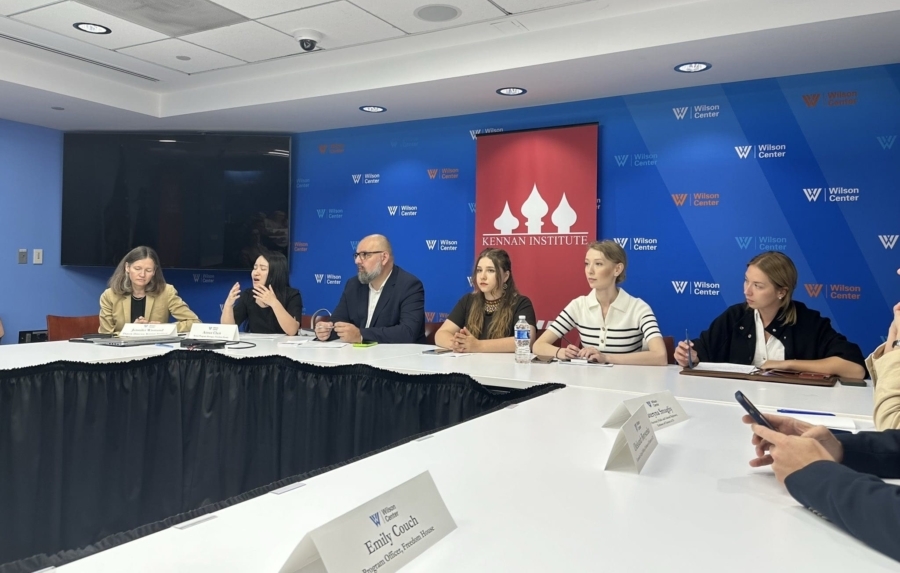 Photo: ZMINA, RCPR and Freedom House at a briefing in Washington
Photo: ZMINA, RCPR and Freedom House at a briefing in WashingtonIn addition, human rights defenders joined the event “Indoctrination of Ukrainian children: how to bring the guilty to justice” organized by Razom for Ukraine in New York with the participation of scientists, activists and journalists. Juri Jurkevitš, Head of Freedom House in Ukraine, believes that “the audience was interested in learning the details of our research, especially regarding the role of the Union State of Belarus and Russia, the responsibility of high-ranking officials, in particular, Lukashenko, as well as the instrumental use of GONGO (ed. – government-organized “non-governmental” organizations) in the relocation of Ukrainian children“.
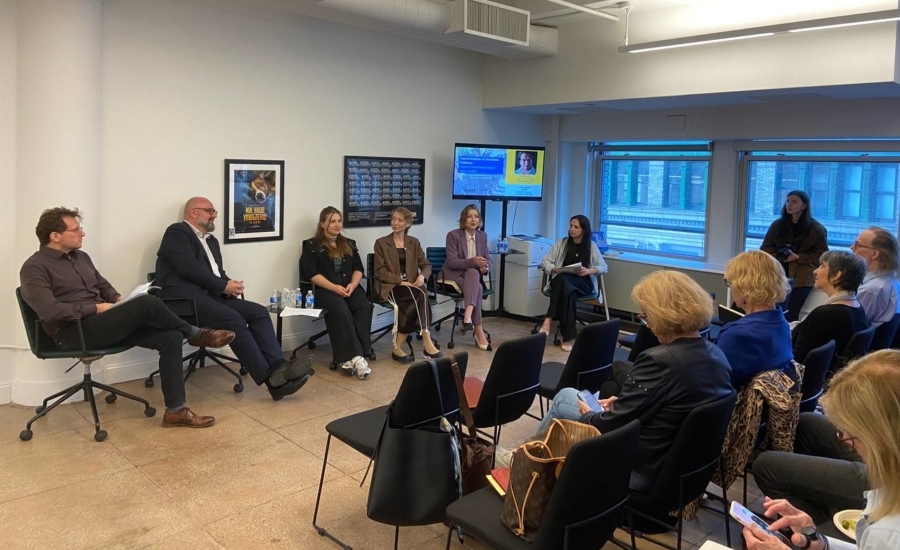 Photo: Sunset in New York
Photo: Sunset in New YorkIn Brussels, experts met with the European External Affairs Service, members of the European Parliament and delegates of the Council of the EU’s Working Groups on Eastern Europe and Central Asia and human rights. They called on the international community to ensure justice by investigating the involvement of Belarus and the Union State in the systematic displacement, indoctrination and militarization of children, as well as the introduction of individual sanctions and the harmonization of sectoral restrictions between Russia and Belarus.
“All involved stakeholders not only showed a deep interest in the topic and demonstrated an understanding of the nature of the crimes committed by Belarus together with Russia, but also expressed their readiness to continue working on establishing justice through sanctions and other mechanisms,” says Oksana Suburai, Freedom House Project Manager.
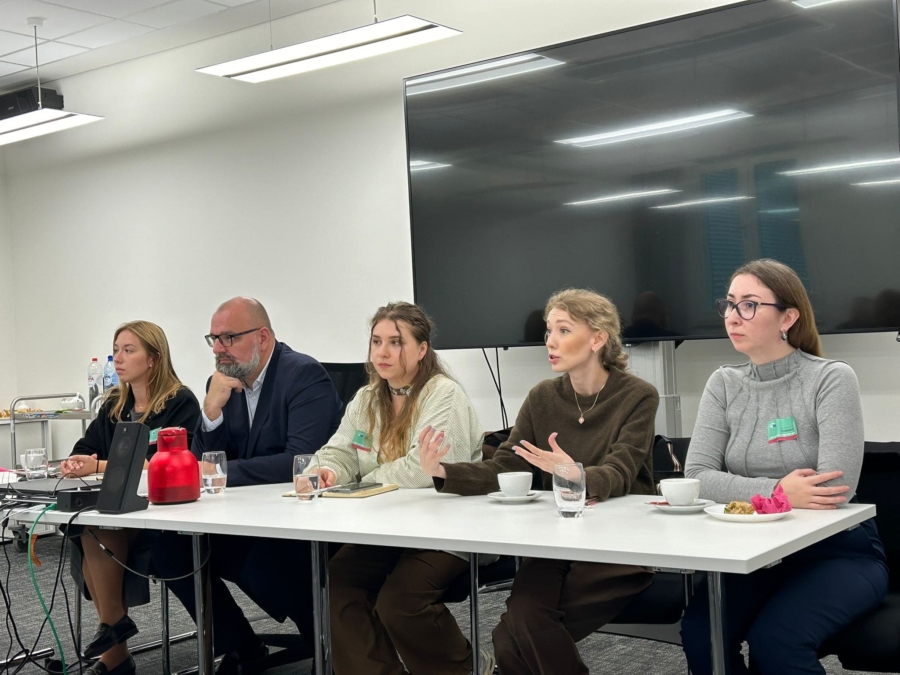 Human rights defenders at a briefing for the Working Groups of the Council of the EU on Eastern Europe and Central Asia and human rights in Brussels
Human rights defenders at a briefing for the Working Groups of the Council of the EU on Eastern Europe and Central Asia and human rights in BrusselsMembers of the advocacy trip also met with representatives of countries that had experience in identifying and rehabilitating children, documenting and creating truth and reconciliation commissions, including Argentina, Peru, Paraguay, South Korea, Sudan, and Mexico.
Tetiana Zhukova, International Advocacy Manager at ZMINA, says that it is worth paying special attention to the countries of the African, Asian and Latin American continents in order to involve them in participating in the International Coalition for the Return of Ukrainian Children, to promote their mediation in the creation of a mechanism for the return of children. “In addition, it is necessary to create a systematic program for the reintegration and rehabilitation of children, involving states that have experience working with children in armed conflict zones,” Zhukova said.
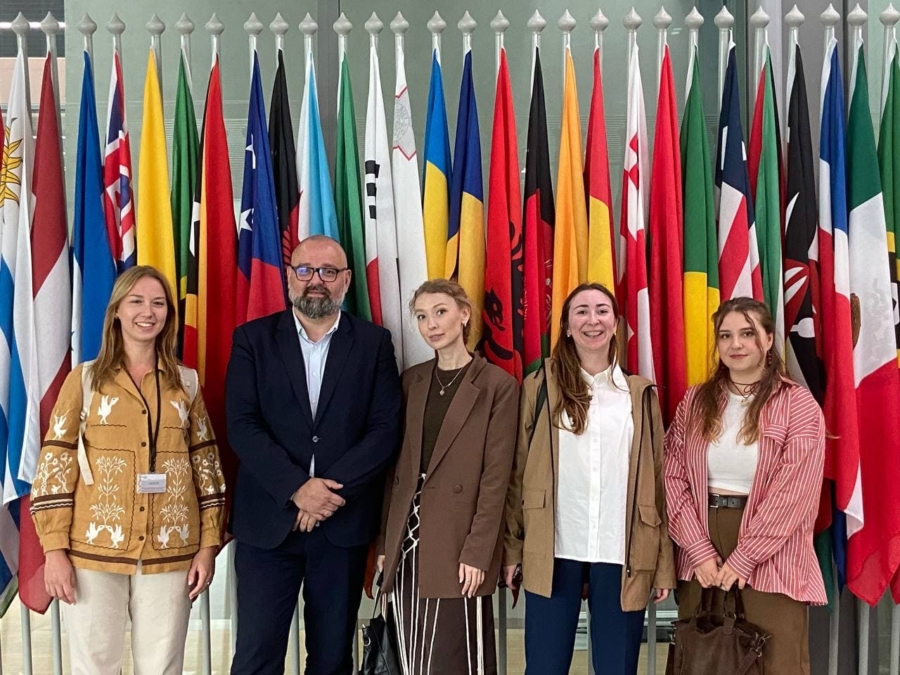 Photo: ZMINA, RCHR and Freedom House at the International Criminal Court
Photo: ZMINA, RCHR and Freedom House at the International Criminal CourtMeetings with civil society and employees of the Ministry of Foreign Affairs were held in The Hague. In addition, human rights defenders met with the Office of the Prosecutor of the International Criminal Court and discussed the communication on political indoctrination and militarized re-education of children on the territory of Belarus.
“The communication is unique, because for the first time in the history of international courts and tribunals, it is about the discriminatory persecution of children. Criminals deliberately selected children for re-education due to their age, nationality, place of residence and belonging to vulnerable categories such as orphans, children with disabilities and those deprived of parental care. The political indoctrination and militarization of these children caused serious and long-lasting negative consequences both for each individual child and for the Ukrainian nation,” concluded Kateryna Rashevska, Lawyer at the Regional Center for Human Rights.
If you have found a spelling error, please, notify us by selecting that text and pressing Ctrl+Enter.















